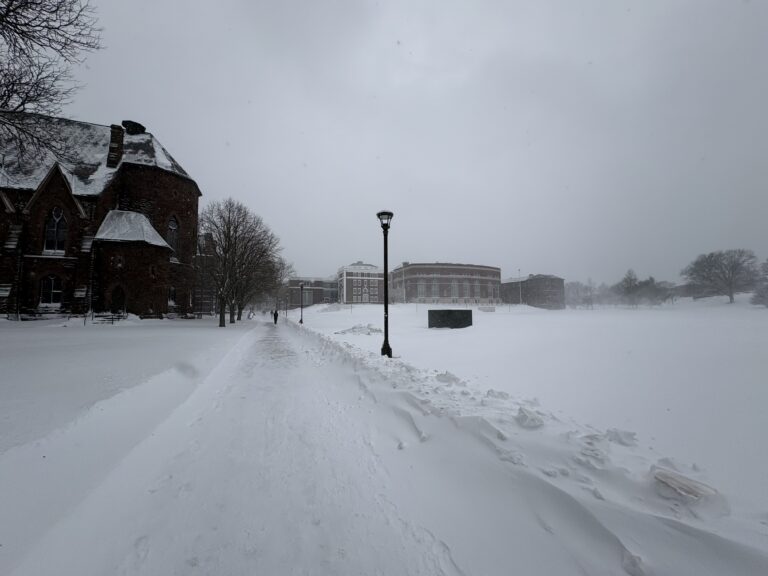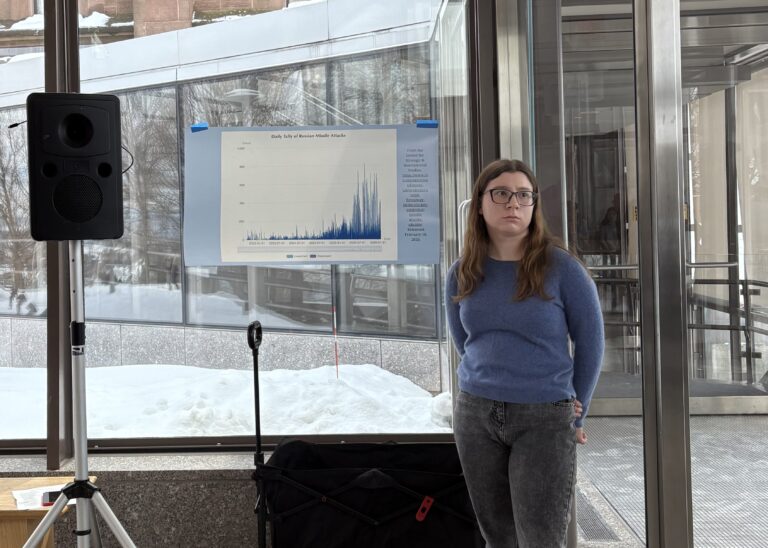Panelists Discuss the Historical Context of the Ebola Outbreak
A lunch panel on Oct. 6 explored the historical context of the recent Ebola outbreak. Panelists were Professors of History Laura Twagira and William Johnston and Professor of Government Michael Nelson; the event was part of the History Department’s “History Matters” lecture series.
History Department Chair Madga Teter spoke to the importace connecting historical significance with current events.
“One of the prime reasons for this discussion, and the one on Scotland a couple of weeks ago, was the initiative from the History Department to illuminate the importance of history for understanding current events,” Teter said. “For history majors-–and now also minors–this is not news, but many students think history is only about the past. We in the History Department want to highlight that much of what is going on in the world cannot be fully understood without delving into history. Analysis in the media is often rather shallow… our faculty can help deepen our perspective.”
Johnston, who studies the history of infectious diseases, opened the panel with a discussion of the science of the virus.
“The Ebola virus infects us, and in doing so it affects the immune system, the vascular system,” Johnston said. “It first of all affects the dendritic cells, which are in the immune system. Disabling that, it disables the ability of the innate immune system and the acquired immune system both to respond to the Ebola. As a consequence, once infected, the body doesn’t realize that this is something really bad which it should be getting rid of. Then the Ebola virus can just take off and reproduce.”
Twagira then moved into a discussion of the history of the three countries most affected by the outbreak: Guinea, Liberia, and Sierra Leone. She discussed the impact of recent political conditions on these nations’ ability to respond to the virus.
“There’s a recent history of civil war that involved all three of these countries,” Twagira said. “They do have a regional history not only of conflict but also of cooperation. From the 1980s to about the early 2000s, both Liberia and Sierra Leone were drawn into a series of civil wars and cross-border conflicts that did result in major civilization casualties but also a major destruction of the public infrastructure that would have included medical institutions.”
Twagira noted the importance of the political history in understanding the severity of the outbreaks in Guinea, Liberia, and Sierra Leone versus the conditions in more politically stable countries such as Senegal.
“Relating back to the political history of the Civil War and the impact it had on the medical infrastructure allows us to understand why this region, why now, why it’s so bad compared to past outbreaks is one example of how history can help you to understand current events,” Twagira said. “Why things look different in Senegal is because they have a different political history that has allowed for their infrastructure to better handle the outbreak that could have happened in Senegal that didn’t.”
Amarachi Asonye ’16 spoke from personal experience about the response to Ebola in Nigeria, where she had an internship. The nation has seen local, but not widespread, outbreaks.
“This summer I was in Nigeria for an internship studying the health infrastructure,” Asonye said. “At that moment, the doctors were trying to figure out something with the federal government for when, with the outbreak of Ebola, how are we going to combat this and how are we going to step up our infrastructure. When I left, it seemed like they were really strong in knowing how to prepare for the outbreak.”
Nelson wrapped up the panel by discussing the groups that have sent aid to the countries currently impacted by the public health crisis. Nelson also spoke about recently proposed travel restrictions in impacted countries and the potential consequences of such policies.
“This will actually cause some of the second-order problems that…[the United States] official policy is concerned with stopping in terms of the financial well-being of these countries,” Nelson said. “All three countries were projected to have between 4 to 14 percent increase in GDP this year, and now they’re all expected to potentially have declines. The outbreak crisis is very serious for all three countries economically.”
Jaxie Friedman ’15 attended the panel because she was interested in understanding the health crisis at a deeper level than is presented by the news media.
“I’m personally really interested in public health issues and with the widespread coverage of the Ebola crisis, I’ve found that I’m kind of ignorant about what was actually going on,” Friedman said. “I think it would be beneficial for us to go back and look at the [Centers for Disease Control and Prevention] and [World Health Organization] websites and kind of see where the actual numbers are coming from and compare those to the news media numbers so we can see what the truth is and what’s being portrayed so we can have a more balanced view of the issue.”
Twagira further emphasized the importance of using alternative sources to supplement the often sensationalist articles run by the news media.
“Getting information from a wide variety of resources that will address the political aspect…thinking about education themselves about the actual history that plays a role in this particular outbreak is something that students could do to go beyond the superficial reporting that they might see on the news or from one particular report,” Twagira said.
In particular, Twagira suggested that students use websites such as Pambazuka Press and Rutgers University Center for African Studies to inform themselves about the outbreak.
Twagira further spoke to the importance of using these news sites to avoid conceptualizing Africa as ridden with disease that it is incapable of containing. She stated that one of the primary roles that University students can play in response to the outbreak is to promote awareness about the negative depiction of Africa in many stories about Ebola.
“There are ways for students that are interested in organizing somehow to be involved that could be productive,” Twagira said. “It would be a range of things that they could do from actively organizing to send assistance or donations or thinking about the way that we think about Africa on campus in particular and to be self-aware of the negative representations of Africa that come out of these media reports and not allowing that to impact campus culture.”
The discussion of Ebola at the University will continue on Thursday, Oct. 23 with a lecture about the public health response.







Leave a Reply